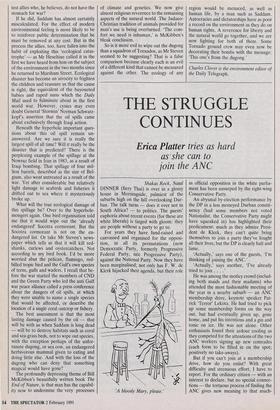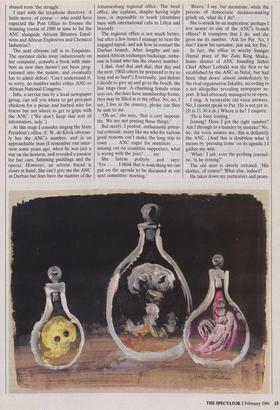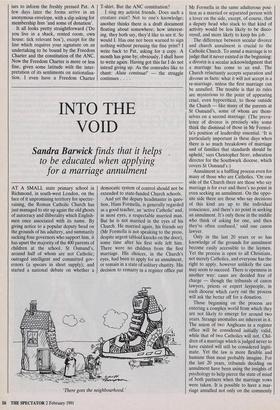THE STRUGGLE CONTINUES
Erica Platter tries as hard as'she can to join the ANC
Shakas Rock, Natal DINNER (fiery Thai) is over in a glossy house in Morningside, palmiest of the suburbs high on the hill overlooking Dur- ban. The talk turns — does it ever not in South Africa? — to politics. The guests' euphoria about recent events (for these are white liberals) is tinged with gloom: they are people without a party to go to.
For years they have fund-raised and canvassed and organised for the opposi- tion, in all its permutations (now Democratic Party, formerly Progressive Federal Party, née Progressive Party), against the National Party. Now they have been marginalised; not only has F. W. de Klerk hijacked their agenda, but their role 'A bloody Mary, please.' as official opposition in the white parlia- ment has been unsurped by the right-wing Conservative Party.
An abysmal by-election performance by the DP in a less moneyed Durban constit- uency (had some members not voted Nationalist, the Conservative Party might have squeaked in) has highlighted their predicament: much as they admire Presi- dent de Klerk, they can't quite bring themselves to join a party they've fought all their lives; but the DP is clearly halt and lame.
`Actually,' says one of the guests, 'I'm thinking of joining the ANC.'
`Actually,' says another, 'I've already tried to join . . .
He was among the motley crowd (includ- ing both maids and their madams) who attended the most fashionable meeting of the year in a nearby suburb — an ANC membership drive, keynote speaker Pat- rick `Terror' Lekota. He had tried to pick up some membership forms on the way out, but had eventually given up, gone home, and put his intentions and a gin and tonic on ice. He was not alone. Other enthusiasts found their ardour cooling as they competed for the attentions of the two ANC workers signing up new comrades (each form to be filled in on the spot; positively no take-aways).
But if you can't join at a membership drive, how do you enlist? With great difficulty and strenuous effort, I have to report. For the ordinary citizen — with an interest to declare, but no special connec- tions — the tortuous process of finding the ANC gives new meaning to that much- abused term 'the struggle'.
I start with the telephone directory. A futile move, of course — who could have expected the Post Office to foresee the stunning events of 1990 in time to list the ANC alongside African Bitumen Emul- sions and African Explosives and Chemical Industries?
The next obvious call is to Enquiries. The operator clicks away industriously on her computer, consults a book with num- bers so new they haven't yet been prog- rammed into the system, and eventually has to admit defeat: 'Can't understand it, so sorry, no number under either ANC or African National Congress.'
Info, a service run by a local newspaper group, can tell you where to get peri-peri chickens for a picnic and barbed wire for fences but not where to get to grips with the ANC. ('We don't keep that sort of information, lady.') At this stage I consider ringing the State President's office. F. W. de Klerk obvious- ly has the ANC's number, and is an approachable man (I remember our inter- view some years ago, when he was just a star on the horizon, and revealed a passion for fast cars, fattening puddings and the opera). However, an activist friend is closer at hand. She can't give me the ANC in Durban but does have the number of the Johannesburg regional office. The head office, she explains, despite having eight lines, is impossible to reach (doubtless busy with international calls to Libya and beyond).
The regional office is not much better, but after a few hours I manage to beat the engaged signal, and ask how to contact the Durban branch. After lengthy and ani- mated African exchanges backstage, some- one is found who has the elusive number.
I dial. And dial and dial, that day and the next. (Will others be prepared to try so long and so hard?) Eventually, just before I decide to give up and go to the beach, the line rings clear. A charming female voice says yes, she does have membership forms; they may be filled in at the office. No, no, I say, I live in the country, please can they be sent to me.
`Oh no,' she says, 'that is very impossi- ble. We are not posting these things.' But surely, I protest, enthusiastic poten- tial comrade, many like me who for various good reasons can't make the long trip to town . . . ANC eager for members . . . missing out on countless supporters, what is wrong with the post? . . . etc.
She listens politely and says: `Yes . . . . I think that is something we can put on the agenda to be discussed at our next committee meeting.' `Bravo,' I say, but meantime, while the process of democratic decision-making grinds on, what do I do?
She is struck by an inspiration: perhaps I live nearer to one of the ANC's branch offices? It transpires that I do, and she gives me its number. 'Ask for Pat. No, I don't know his surname, just ask for Pat.'
In fact, the office in nearby Stanger (burial place of the Zulu King Shaka, home district of ANC founding father Chief Albert Luthuli) was the first to be established by the ANC in Natal, but had been 'shut down' almost immediately by the rival organisation Inkatha, according to a not altogether revealing newspaper re- port. It had obviously managed to re-open.
I ring. A vernerable old voice answers. No, I cannot speak to Pat. He is not yet in. (It is 11.30 a.m.) Where is he? I enquire.
`He is busy ironing.'
Ironing? Have I got the right number? Am I through to a laundry by mistake? No, no, the voice assures me, this is definitely the ANC. (And this is doubtless what it means by 'pressing items' on its agenda.) I gather my wits.
`What,' I ask, ever the probing journal- ist, 'is he ironing?'
The old man is clearly irritated. 'His clothes, of course!' What else, indeed?
He takes down my particulars and prom- ises to inform the freshly pressed Pat. A few days later the forms arrive in an anonymous envelope, with a slip asking for membership fees 'and some of donation'.
It all looks pretty straightforward (`Do you live in a shack, rented room, own house: tick relevant box'), except for the line which requires your signature on an undertaking to be bound by the Freedom Charter and the constitution of the ANC. Now the Freedom Charter is more or less fine, given some latitude with the inter- pretation of its sentiments on nationalisa- tion. I even have a Freedom Charter T-shirt. But the ANC constitution?
I ring my activist friends. Does such a creature exist? Not to one's knowledge; another thinks there is a draft document floating about somewhere; how interest- ing, they both say, they'd like to see it. So would I. Has one not been warned to sign nothing without perusing the fine print? I write back to Pat, asking for a copy. A month has gone by; obviously, I shall have to write again. Having got this far I do not intend giving up. As the comrades like to chant: Aluta continua!' — the struggle continues . . . .




















































 Previous page
Previous page